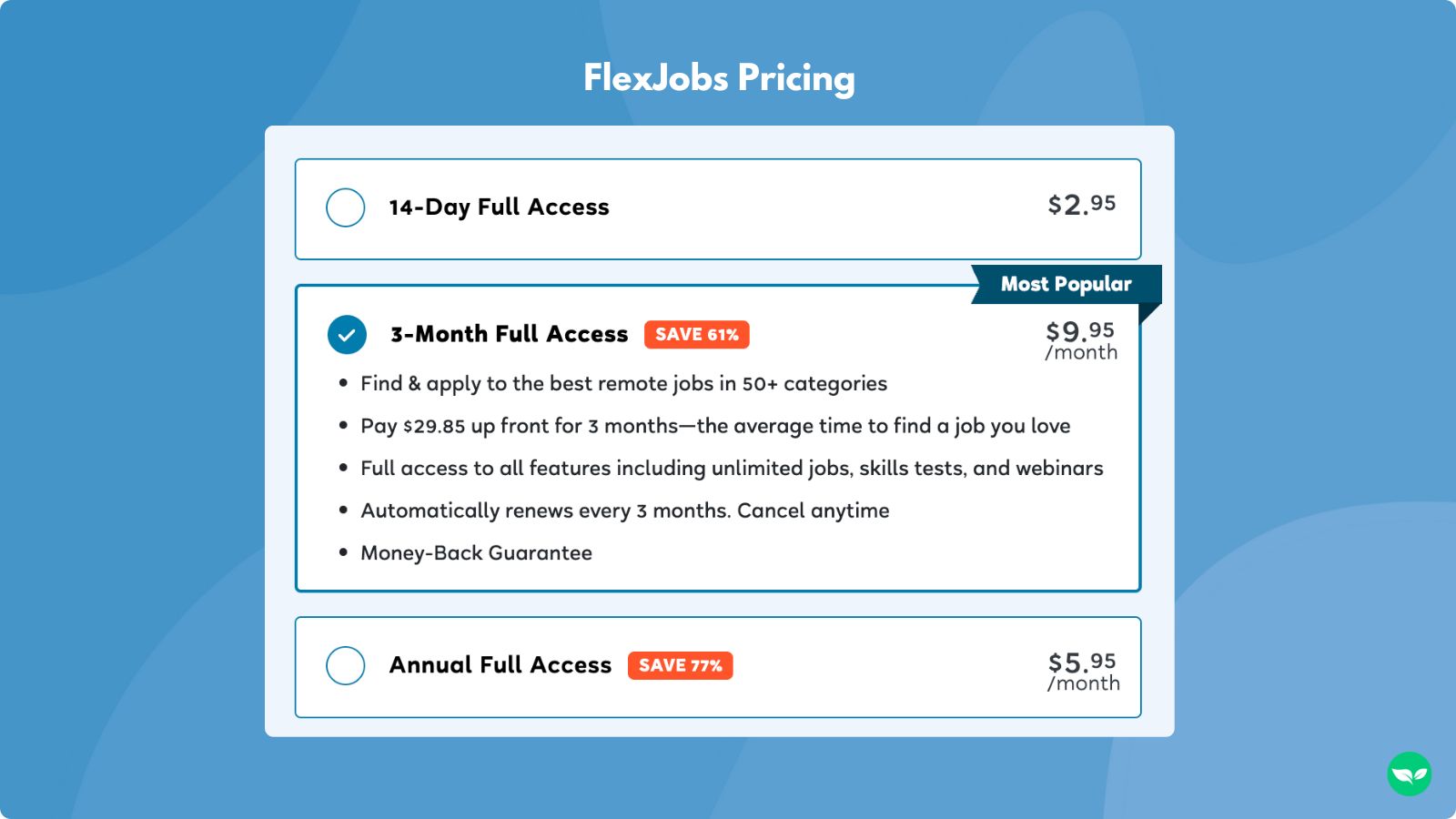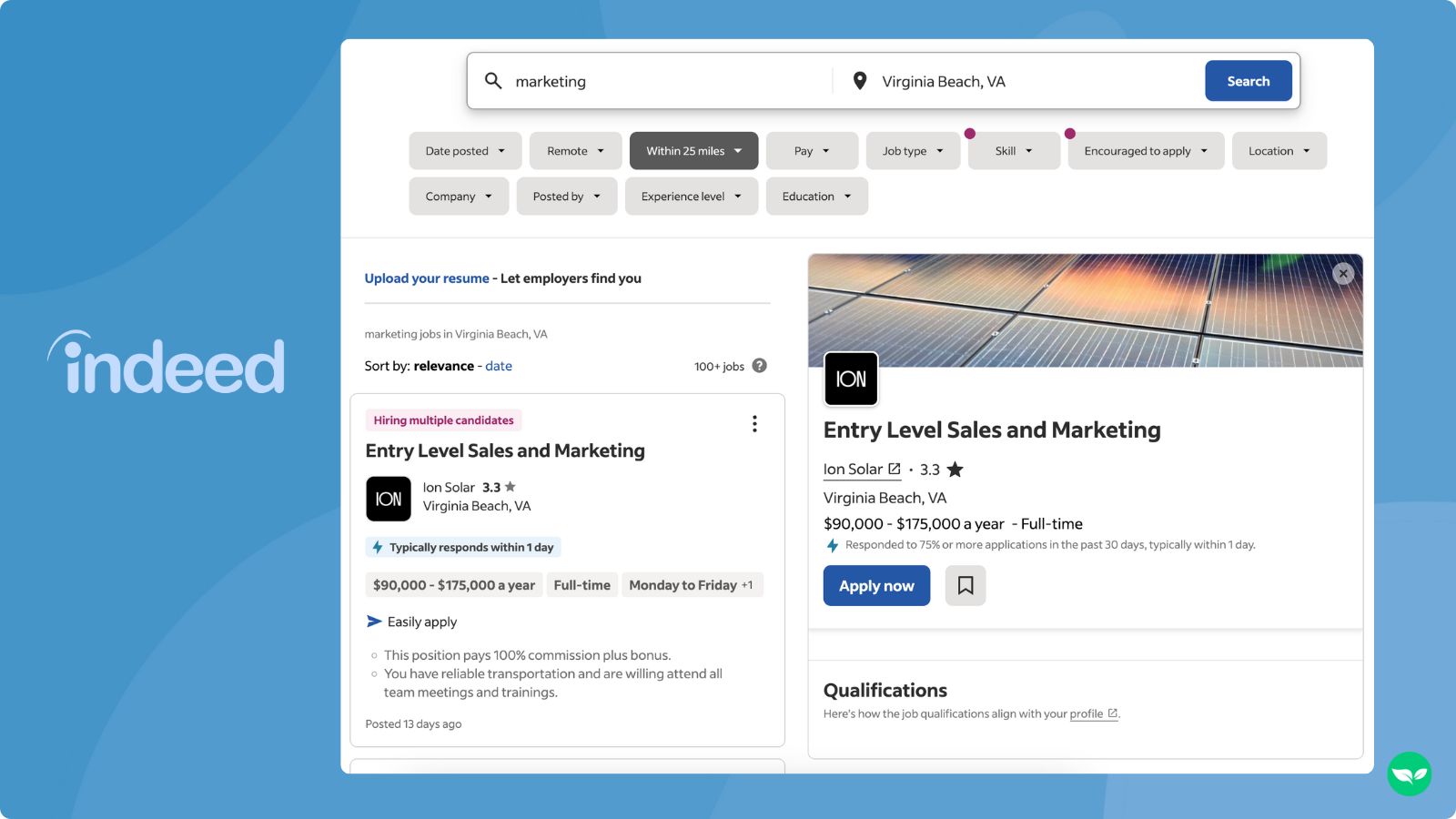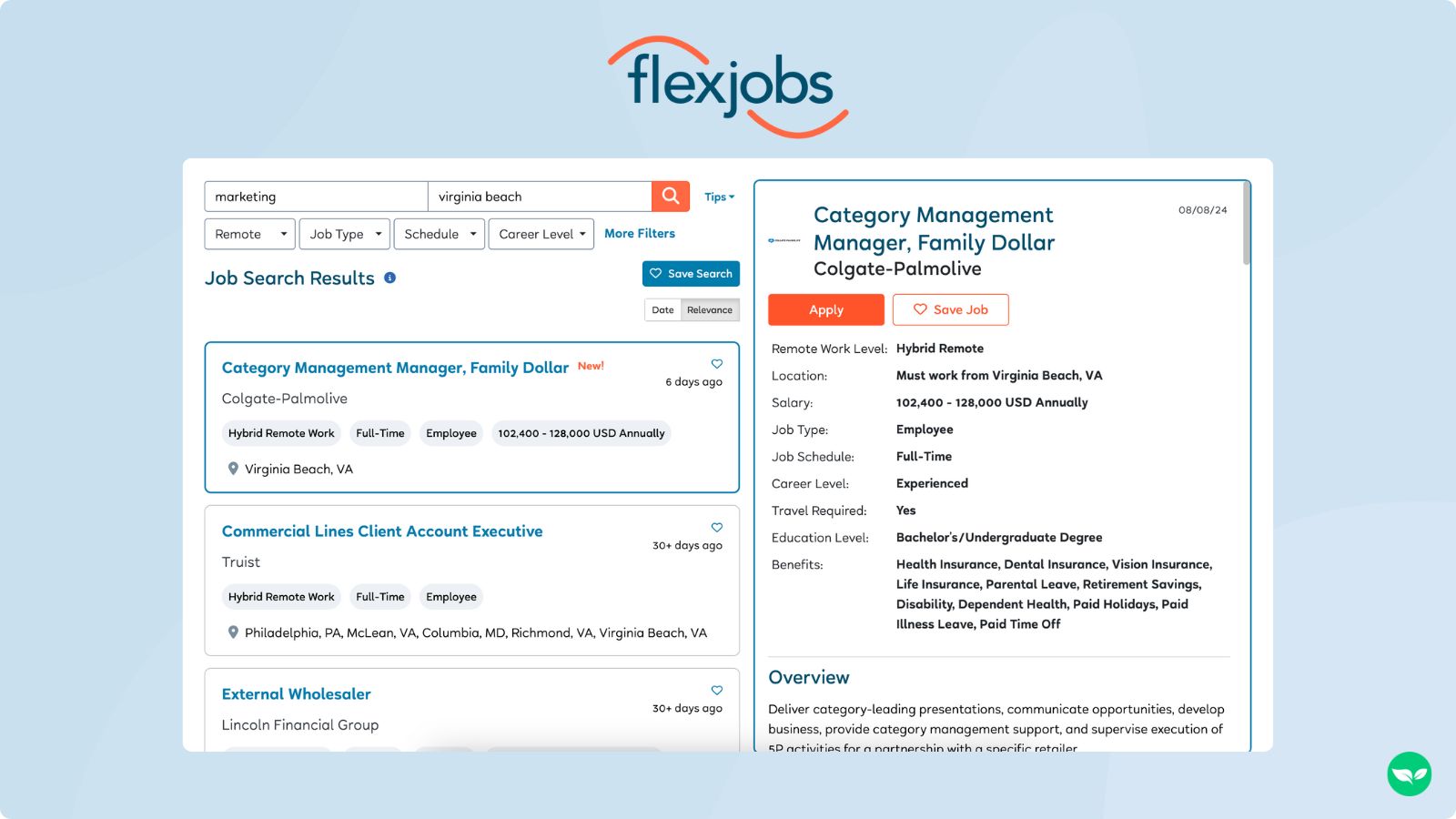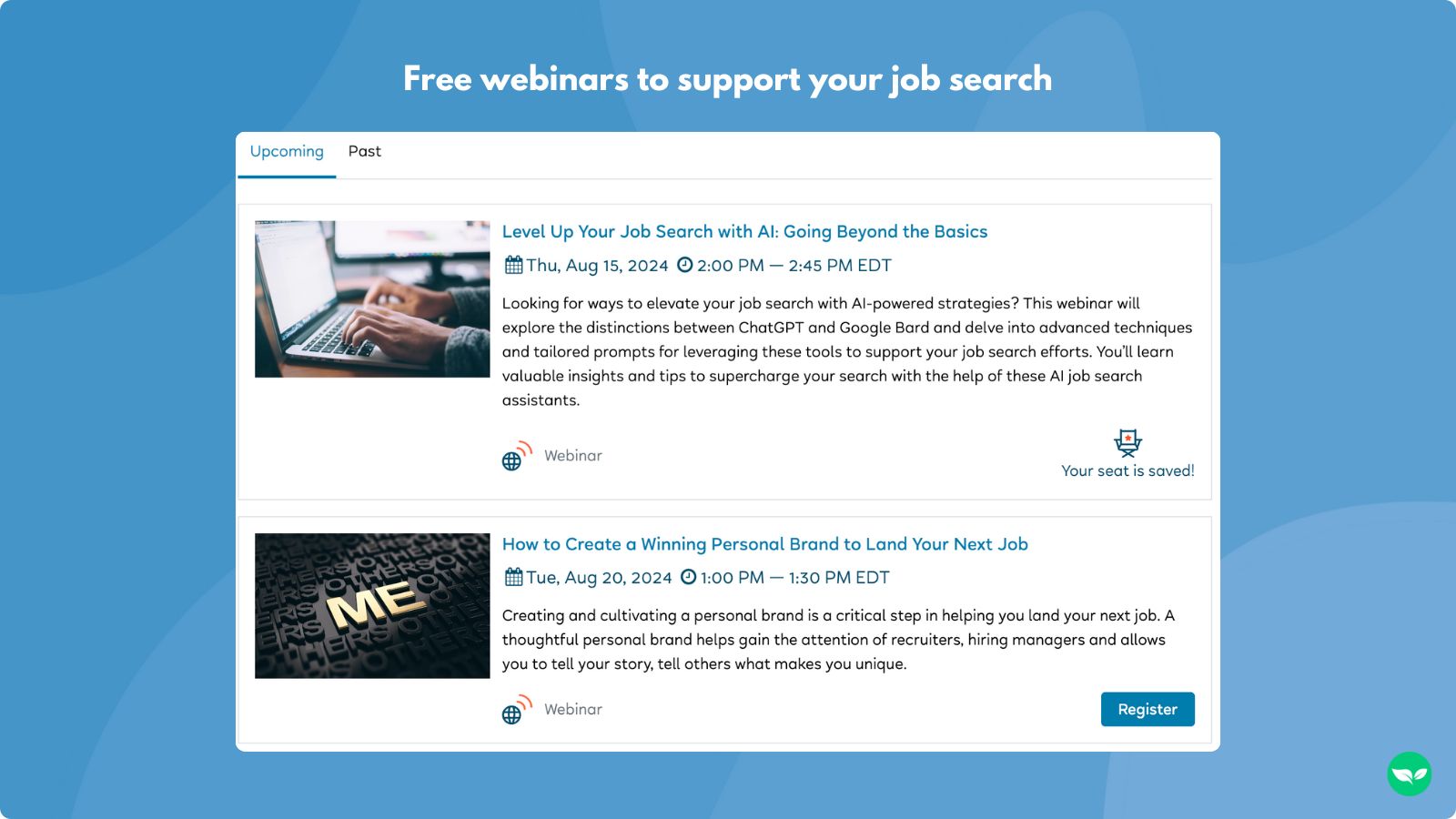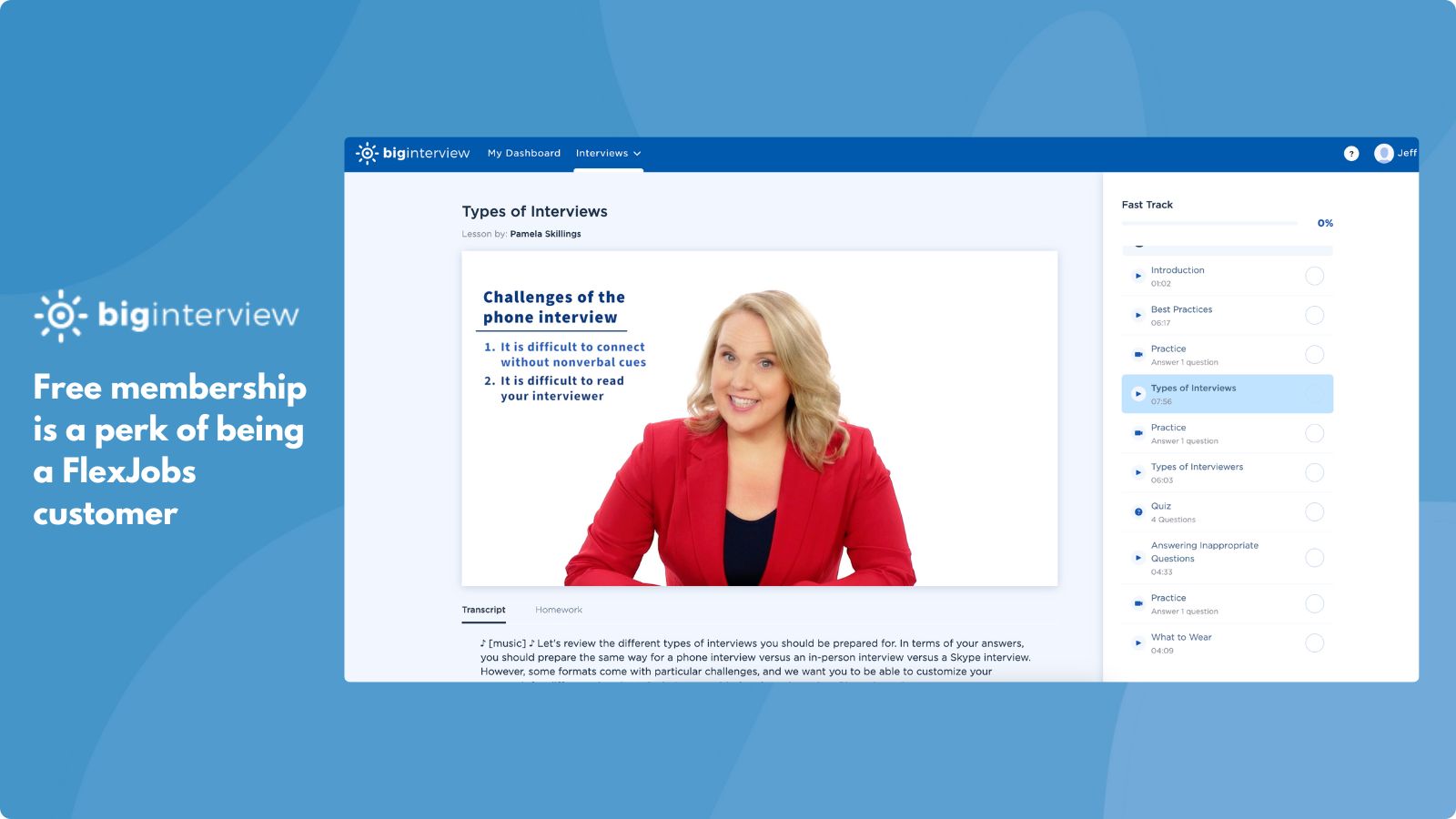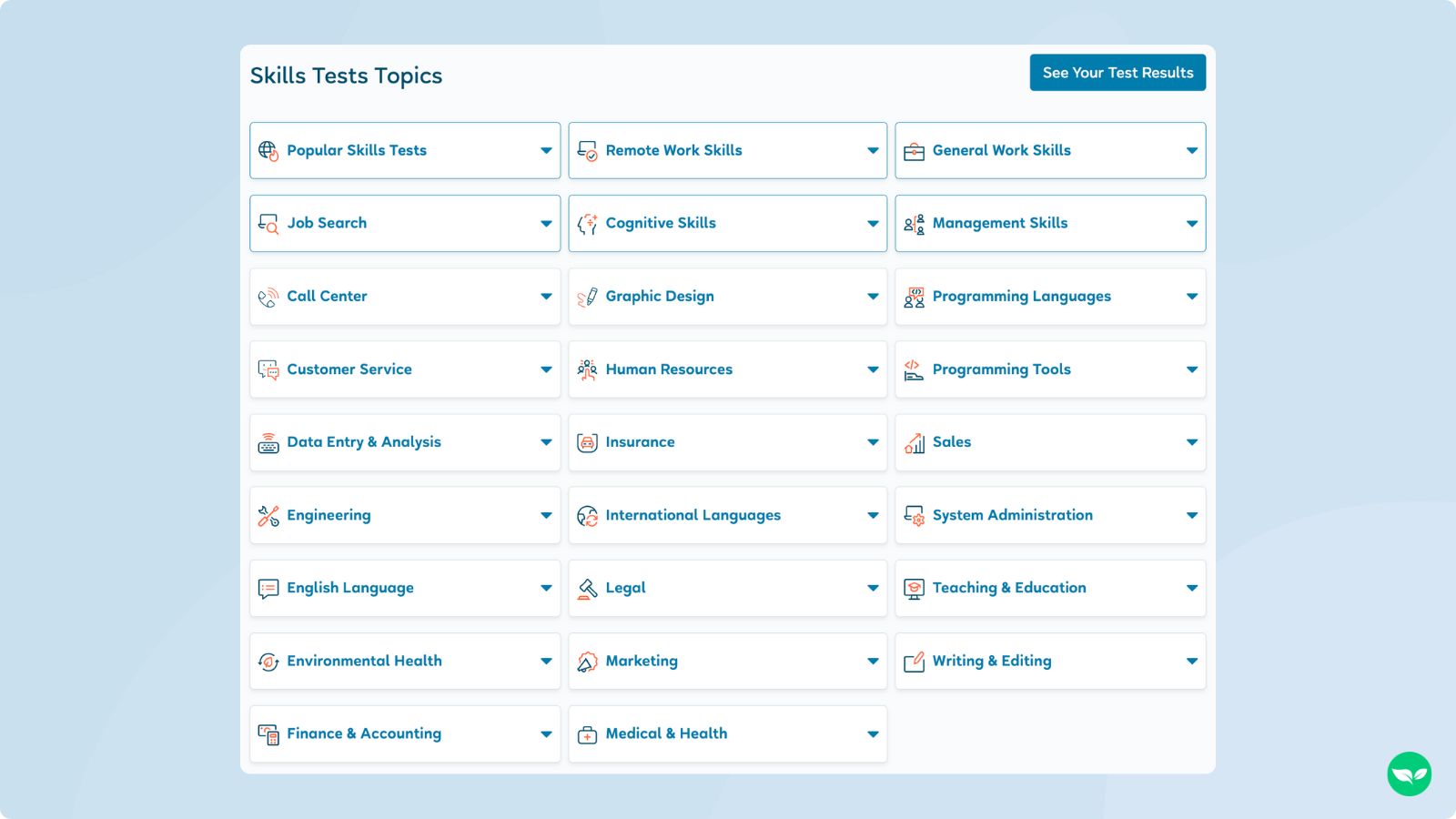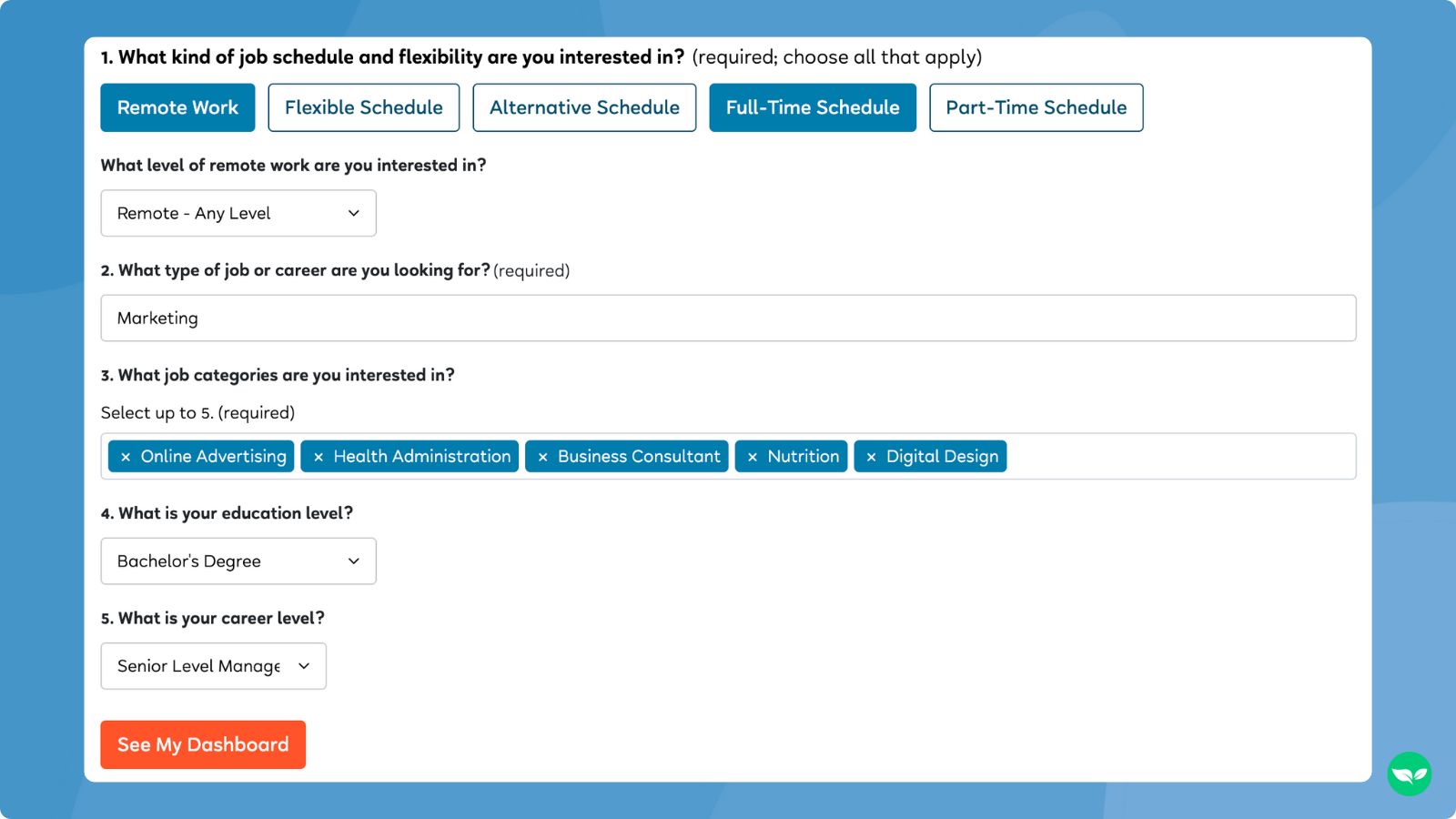FlexJobs Review 2025: Is It Legit, Safe, or Even Worth It?
Job boards can be a frustrating experience, often filled with questionable or entirely fake listings. FlexJobs aims to solve this by hand-screening each job. The real question is whether the cost of membership is actually worth paying.

Some of the links on DollarSprout point to products or services from partners we trust. If you choose to make a purchase through one, we may earn a commission, which supports the ongoing maintenance and improvement of our site at no additional cost to you. Learn more.
| FlexJobs Overview | |
|---|---|
| Founded | 2006; acquired by Bold.com in January 2024. |
| Pricing | 14-Day ($2.95), 3-Month ($9.95/month), and Annual Full Access ($5.95/month) |
| Features | Hand-screened job listings, skills tests, free webinars, career coaching |
| User Rating | 4.5 stars on the Trustpilot (3k reviews), 4.6 stars on Sitejabber (12k reviews) |
| Our Rating | 4.0 stars (see methodology) |
| Best For | Professionals seeking remote or flexible white-collar jobs in fields like administration, customer service, or healthcare, especially those balancing family responsibilities or striving for better work-life balance. It is less suited for blue-collar workers looking for hands-on, labor-intensive roles in industries like construction or manufacturing, where remote or flexible work is uncommon and thus less represented on the platform. |
Imagine landing your dream remote job without sifting through scams and wasting your time on dead-end postings. FlexJobs promises just that — a curated platform for legitimate, high-quality remote and flexible jobs.
But is it worth the subscription fee?
With free job boards like Indeed offering millions of postings, paying for access to a platform like FlexJobs is a big decision when you’re already out of work.
In this review, I’ll break down whether FlexJobs truly offers something special — whether it’s a game-changer for finding remote work or just another site in an already crowded market. By the end, you’ll know if FlexJobs is the right tool to help you land that perfect work-from-home job, or if your money is better spent elsewhere.
What Is FlexJobs?
FlexJobs is a career website that specializes in telecommuting and offers flexible, freelance, and part-time job opportunities. A paid membership is required to access all its features and available job listings.
It was founded in 2006 by Sara Sutton Fell, a working mother who wanted more flexibility in her career, and realized how difficult it was to find legitimate, flexible jobs. In fact, work-from-home scams have become a big problem for many job boards over the last several years.
The percentage of illegitimate job postings can vary, but estimates suggest that around 10-20% of online job listings are scams or fraudulent. This figure can be higher on less regulated platforms like Craigslist, where the lack of screening allows scammers to post more easily.
Even on the world’s largest job boards like Indeed and LinkedIn, scams can slip through due to the sheer volume of listings, although these platforms do have measures in place to reduce fraudulent activity.
Common scam jobs that can often be found on less reputable job boards include:
- Reshipping Scams: These positions involve receiving packages and then forwarding them to another address, often overseas. The scam involves stolen goods, leaving the "employee" responsible for the crime.
- Data Entry Scams: These scams promise easy money for simple data entry tasks but require you to pay upfront for "training" or software, only for the job to vanish after payment.
- Fake Job Offers: These often mimic real companies but use slightly altered email addresses or websites. They might ask for personal information or upfront fees under the guise of processing or training fees.
- Pyramid Schemes: Disguised as marketing or sales roles, these scams focus on recruiting others into the scheme rather than selling an actual product, promising high returns that never materialize.
Scam job opportunities often appear on well-known job boards, including:
- Craigslist: Known for its broad range of postings, Craigslist is frequently targeted by scammers posting fake jobs.
- Indeed: Although popular, Indeed has had issues with scam postings due to the high volume of jobs, making it difficult to screen everything.
- Facebook Jobs: The social media platform's job section can sometimes host fraudulent job offers, as it's easier for scammers to create fake profiles.
These platforms are more vulnerable to scams due to their open posting policies and high traffic.
The Value of Quality over Quantity
As someone who’s spent countless hours on traditional job boards, I know how frustrating it can be to sift through irrelevant or sketchy listings. To put FlexJobs to the test, I ran a simple search for “marketing jobs” on both Indeed and FlexJobs.
When I entered the query on Indeed, the first result was a door-to-door solar panel sales gig with 100% commission-based pay. Not exactly what I had in mind for a marketing gig.
Not a scam listing per se, but definitely not a traditional work setup, and one I imagine most people are not looking for when they search for a marketing job.
In contrast, FlexJobs served up a manager-level marketing position at Family Dollar right off the bat.
For less than $3, I avoided getting sucked down the rabbit hole of knocking on doors and slinging solar panels. Instead of sifting through junk like commission-only sales roles, FlexJobs delivers curated, relevant opportunities that are actually worth your time.
To be fair, Indeed does generally feature some high-quality jobs as well, and you can definitely find solid opportunities there. However, you might have to wade through a lot more listings that don’t quite match what you’re looking for, like sales positions disguised as marketing roles. If you’re serious about landing a specific type of job, paying for a service that cuts through the noise could save you a lot of frustration.
Extra Perks I Found After Joining
When I signed up for FlexJobs, I initially focused on the job listings. But as I explored, I stumbled upon some unexpected perks. For example, they offer free webinars on everything from job-hunting tips to balancing remote work, which I found pretty useful.
Then, I discovered Big Interview by ResumeBuilder — a tool included with my membership. It has mock interviews, practice questions, and video lessons that help you prepare for interviews. These perks were a nice surprise and added real value to my FlexJobs experience.
While I was poking around the dashboard, I came across a section called “Skills Tests”. These tests cover everything from software proficiency to language abilities, offering a practical way to assess and showcase your skills.
You can use them to identify areas where you’re strong or where you might need improvement. It’s a straightforward feature that can help bolster your profile, making it easier to stand out when applying for jobs.
Most Popular Job Industries on FlexJobs
On FlexJobs, the most popular industries for remote jobs include Computer & IT, Accounting & Finance, Marketing, Medical & Health, and Project Management. These categories consistently offer the highest number of remote job postings, reflecting a strong demand for skilled professionals in these fields.
For example, computer and IT roles remain at the top, closely followed by opportunities in accounting and finance, which are also among the strongest sectors for remote work. Marketing, customer service, and sales are other notable areas with frequent remote job listings.
Pros & Cons of FlexJobs
Like any service, FlexJobs comes with its own set of benefits and drawbacks. In this section, I’ll break down what I found to be the key pros and cons, helping you weigh whether a subscription might be the right fit for your job search needs.
Pros
- Curated job listings. One of the biggest advantages of FlexJobs is its curated job listings. Every job posted on the site is hand-screened by a team of researchers to ensure it’s legitimate and offers true flexibility, such as remote work or part-time hours. This drastically reduces the chances of encountering scams or irrelevant postings, which are common on free job boards.
- Diverse job categories. FlexJobs caters to a wide range of industries, including high-demand fields like IT, marketing, healthcare, and project management. This diversity ensures that users from various professional backgrounds can find opportunities that match their skills and career goals.
- Additional resources. Beyond job listings, FlexJobs provides valuable tools like skills tests, webinars, and access to Big Interview for interview preparation. These resources help job seekers improve their applications and boost their chances of landing a job.
- Ad-free experience. FlexJobs offers an ad-free platform, meaning users can search for jobs without being bombarded by unrelated ads or distractions, which is a common issue on other job boards.
Cons
- Subscription fees. Unlike many job boards, FlexJobs requires a paid subscription, with fees ranging from $2.95 for 14 days to $5.95/mo for a year. This cost can be a barrier for some job seekers, especially when there are free alternatives available.
- Limited free features. While FlexJobs offers many perks, most of these are locked behind the subscription paywall. Free users have very limited access, which might deter those who aren’t ready to commit financially before testing the platform.
- Not all jobs are unique. Some of the jobs listed on FlexJobs may also be found on free job boards. While FlexJobs offers the advantage of curation and reduced risk of scams, some users might question the need to pay for jobs that could potentially be found elsewhere for free.
- Focus on certain industries. Although FlexJobs covers a wide array of industries, the most robust offerings tend to be in fields like IT, marketing, and healthcare. Job seekers in less common or highly specialized industries might find fewer opportunities compared to mainstream career fields.
Overall, FlexJobs is a good resource for those who value quality and are willing to pay for a safer, more focused job search experience. However, the subscription cost and limited access to some features could be drawbacks for others.
Using FlexJobs Job Search Filters
FlexJobs offers a robust set of job search filters designed to help users quickly zero in on the roles that best match their needs. The platform allows you to filter jobs by industry, job type (such as full-time, part-time, freelance, or temporary), and experience level. This granularity can save you time by narrowing down the search to only the most relevant listings.
Additionally, FlexJobs provides options to filter by remote work level — from 100% online jobs to hybrid roles—giving you control over the type of flexibility you’re looking for. You can also refine your search by job categories, such as marketing, IT, healthcare, and more, making it easier to find opportunities in your specific field.
The platform also includes filters for schedule preferences (like flexible, alternative, or seasonal schedules) and location, which is especially useful if you need a job within a particular geographic area, even if it’s remote. FlexJobs’ advanced filters, such as required travel and employer type (e.g., nonprofit, startup), offer even more customization to align your search with your personal and professional goals.
These filters are straightforward to use, helping you tailor your job search efficiently without wading through irrelevant listings, a significant improvement over many other job boards where such detailed customization isn’t always available. This feature is particularly valuable given that remote and flexible jobs often come with unique requirements and conditions that aren’t easily filtered on more generic platforms.
User Testimonials
Through my research, I was able to find a few people willing to speak on their experience with FlexJobs. FlexJobs has worked well for many users, though their experiences reflect a mix of challenges and successes:
Grace N., a project manager, was initially hesitant but ultimately found value in the platform. “I was working multiple part-time jobs and was ready to commit to full-time remote work with benefits. FlexJobs helped me get there, but it took some time and patience. The listings are high quality, but you still need to put in the effort to find the right fit.”
Lori S., a registered nurse, found FlexJobs helpful but noted it wasn’t a magic solution. “Finding jobs that fit my needs took some searching, but FlexJobs definitely made it easier. It’s not perfect—there’s still work involved—but I found two good jobs through the site, so I think it’s worth the cost if you’re serious about finding flexible work.”
Sarah H. had a long job search but appreciated the steady stream of relevant job listings. “FlexJobs kept me going when my job search was dragging on. I found a flexible role that fit my new consulting career, but it wasn’t instant. You still have to sift through and apply, but it’s less frustrating than other sites.”
So, while FlexJobs isn’t a one-click solution to finding the perfect job, it does offer valuable tools and a curated selection of legitimate opportunities that can make the job search process more manageable for those willing to put in the effort.
Is FlexJobs Worth It? I Ran the Numbers to Find Out
Let’s consider a typical job seeker who uses both FlexJobs and a free job board like Indeed. For this example, we’ll assume they pay $29.85 for three months of unlimited access to FlexJobs, and they aim to submit 200 job applications during this period, which is a common number for a thorough job search.
Time Saved
On a free job board like Indeed, it’s not uncommon to spend significant time sifting through irrelevant or low-quality listings. Suppose that, on average, it takes 10 minutes per job to sort through postings, identify scams, and tailor an application. Over 200 applications, that adds up to 33 hours just sorting through job listings.
FlexJobs, with its curated listings, drastically reduces the time spent filtering out irrelevant jobs. If the time spent per application is cut in half to 5 minutes, this would save approximately 16.5 hours over the same 200 applications.
Monetary Value of Time Saved
To estimate the monetary value of the time saved, let’s use the average hourly wage in the U.S., which is about $28.50 as of 2024. By saving 16.5 hours, the job seeker essentially saves $470.25 in time, which is a significant return on the $29.85 investment for a FlexJobs subscription.
Opportunity Cost
Additionally, time saved can be reinvested into more meaningful activities, such as networking, skill-building, or even applying to more jobs. Faster access to high-quality jobs can also lead to securing a position sooner, potentially reducing the time unemployed, which has its own financial benefits.
Should You Use FlexJobs?
If you’re still with me at this point, you’re clearly invested in finding the best way to navigate your job search.
If you have a little cash on hand, consider the 3-month full-access membership. It comes with a money-back guarantee, so there isn’t a lot to lose here, outside of being on their marketing list until you unsubscribe.
I don’t see a whole lot of value in paying the annual full-access tier unless you have significant corporate experience and are periodically searching for C-level positions that open that you’d otherwise not known about.
Ultimately, If you don’t have just shy of $30 to front for their 3-month-access tier, the 14-day trial at $2.95 might be worth it just to see if it makes your search more efficient and less stressful. After all, the sooner you start focusing on applying to quality jobs, the closer you’ll be to landing the one that’s right for you.
Related:
- 19 Flexible Stay-At-Home Jobs for Moms That Pay Well
- 25 Best Gig Economy Jobs for Earning Supplemental Income
- 20 Best Places to Find Small Task or Micro Jobs


